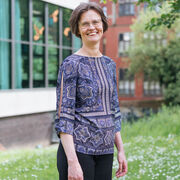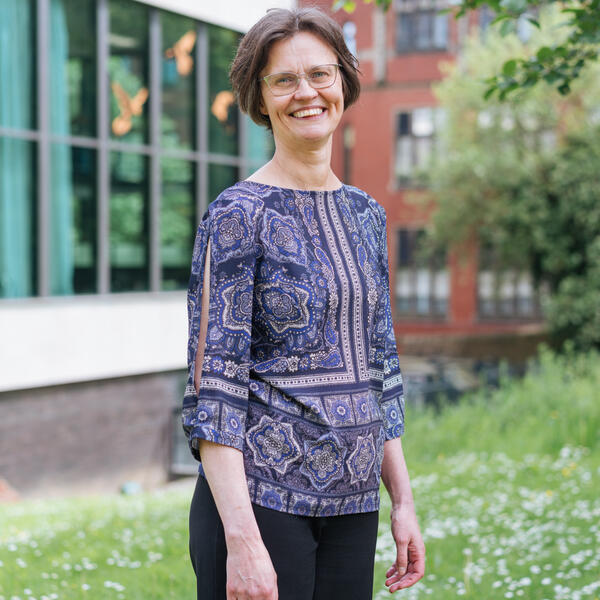Rosanna Keefe
(BA, PhD Cambridge)
School of History, Philosophy and Digital Humanities
Professor of Philosophy


Full contact details
School of History, Philosophy and Digital Humanities
9 Mappin Street
Sheffield
S1 4DT
- Profile
-
Rosanna has worked in Sheffield since 1999, after completing her PhD at Cambridge University and spending three years as a Research Fellow there. She spent five years as Head of the Philosophy Department in Sheffield and is currently Student Experience Lead in the School of History, Philosophy and Digital Humanities.
Many of her main philosophical interests lie within the philosophy of logic and language and metaphysics, with Vagueness, Paradoxes, Logical Pluralism and Degrees of Belief featuring as recurrent themes. Her monograph, Theories of Vagueness (CUP 2000) explores the vagueness of natural language, asking such questions as what the logic and semantics of vague language are, and with what methodology we should construct and assess theories of vagueness. She defends a supervaluationist theory of vagueness.
Rosanna's current main project is on Vague Beliefs and Degrees of Belief. It argues that the category of beliefs is unavoidably vague, with many interesting and important types of situations and states which are candidates for borderline beliefs. Recognising and exploring this vagueness is key to tackling a range of issues regarding our doxastic states, our reasoning and our understanding of ourselves and others, Rosanna claims. The project grapples with topics within Epistemology and Formal Epistemology, Philosophy of Mind and Cognitive Science, Metaphysics and Philosophy of Language.
Postgraduate supervision
I would be happy to consider supervising PhD students in a range of areas including many topics within Philosophy of Language, Philosophical Logic and Metaphysics and others within Epistemology, Philosophy of Mind, Philosophy of Mathematics and Philosophical Methodology.
I have previously supervised students on topics including Vagueness, Philosophy of Mathematics, Modality, Truth, Animal Minds, Conditionals, Externalism, Proper Names, the Metaphysics of Mind, Feminist Philosophy of Language, Social Epistemology and Philosophical Methodology. My students have gone on to academic positions across the UK, Spain, Germany, Canada, Mexico, France and China.
- Publications
-
Books
Edited books
Journal articles
- Belief, certainty and vagueness. Disputatio, 16(72), 1-19. View this article in WRRO


- Degrees of belief, expected and actual. Synthese, 194(10), 3789-3800.


- Modelling higher-order vagueness: columns, borderlines and boundaries . Proceedings of the Aristotelean Society, Supplementary Volumes, 89(1), 89-108. View this article in WRRO


- What Logical Pluralism Cannot Be. Synthese, 191, 1375-1390.


- Modelling vagueness: what can we ignore?. Philosophical Studies: an international journal for philosophy in the analytic tradition, 161(3), 453-470.


- Phenomenal Sorites Paradoxes and Looking the Same. DIALECTICA, 65(3), 327-344.


- Teaching & Learning Guide for: Vagueness: Supervaluationism. Philosophy Compass, 5(2), 213-215.


- Special issue on vagueness. Studia Logica, 90(3), 287-289.


- Vagueness: Supervaluationism. Philosophy Compass, 3(2), 315-324.


- Vagueness without context change. MIND, 116(462), 275-292.


- Unsolved problems with numbers: Reply to Smith. Mind, 112(446), 291-293.


- When does circularity matter?. Proceedings of the Aristotelean Society, 102(1), 275-292.


- Indeterminate identity: Metaphysics and semantics. MIND, 111(442), 466-470.


- The concept of 'ignorance' in Jean-Paul Sartre's 'Notebooks for an Ethics' and 'Truth and Existence'. J BRIT SOC PHENOMEN, 32(1), 66-80.


- Vagueness by numbers. Mind, 107.


- Vagueness and language clusters. Australasian Journal of Philosophy, 76.


- Contingent Identity and Vague Identity. Analysis, 55.


Book chapters
- Context, Vagueness, and the Sorites: Comments on Shapiro, Liars and Heaps New Essays on Paradox (pp. 73-83).


- Prefaces, Sorites and Guides to Reasoning, Conditionals, Paradox, and Probability (pp. 212-226). Oxford University Press


- Essentialism and Logical Consequence In Fred-Rivera I & Leech J (Ed.), Being Necessary: Themes of Ontology and Modality from the Work of Bob Hale (pp. 60-76). Oxford University Press


- Pluralisms: Logic, Truth and Domain-Specificity, Pluralisms in Truth and Logic (pp. 429-452). Springer International Publishing


- Relative Validity and Vagueness In Lear J & Oliver A (Ed.), The Force of Argument: 1 (pp. 127-143). Taylor & Francis


- Supervaluationism, Indirect Speech Reports, and Demonstratives In Dietz R & Moruzzi S (Ed.), Cuts and Clouds: Vaguenesss, its Nature and its Logic (pp. 360-372). Oxford Univ Press


- Context, Vagueness, and the Sorites, Liars and Heaps New Essays on Paradox University of Hawaii Press


Dictionary or encyclopaedia entries
- Vagueness: Philosophical Aspects. In Encyclopedia of Language Linguistics.


- Belief, certainty and vagueness. Disputatio, 16(72), 1-19. View this article in WRRO
